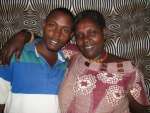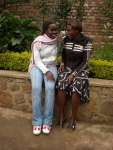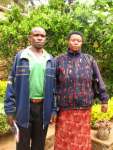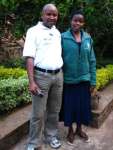Uwamwezi Philomene & Dusabe Nicole
Uwamwezi Philomene talks to Nicole about the difficulties parents face when talking to their children, and how people today can manage busy schedules to remember the past. Dusabe Nicole also wonders about how they can regain trust and love in society when certain people are known to have been murderers, and Uwamwezi Philomene counsels her in love.
Mukangiruwonsanga Agnes & Ntamitondero Muneza Yves
Mukangiruwnsanga Agnes talks to Ntamitondero Muneza Yves about the history of his own name because he has been ashamed of it, and how their personal history and Rwandan history have shaped the naming of youths. She also shares her personal story growing up as one of ten children, and counsels Ntamitondero Muneza Yves on how to be a useful and meaningful member of society for a better future, with tips from learning to keep secrets, to developing a culture of peace.
Mukayiranga Verena & Mugisha Gabriel & Sharangabo Jean de Dieu
Mukayiranga Verena is speaking with two of her adopted sons, Mugisha Gabriel and Sharangabo Jean de Dieu. She tells stories of her struggles with discrimination between the different ethnicities and how there was nothing but love between all Rwandese people before the colonists arrived. Verena shares how she lived in paralyzing fear during the war saying “I could not sleep well; I would think that people would come to kill us.” Despite being traumatized by her experiences she overcame her fear and shares her story with her sons.
Kamanzi Jean Baptiste & Ngango Jean Bosco
Kamanzi Jean Baptiste tells the story of his life's hardships to his younger brother, Ngango Jean Bosco, who has not lived through such times as he has. Kamanzi Jean Baptiste shares with his brother details about his life such as how he joined the army because of abuse and hunger at home, or how he became handicapped and still decided to go to school at the age of 22 with peers who were 12 years old. Ngango Jean Bosco listens to his brother’s words and continues to ask more questions to which Kamanzi Jean Baptiste is happy to answer.
Kwizera Samuel & Igihozo Cindy Providence
Kwizera Samuel shares with his niece, Igihozo Cindy Providence, how people lived together in harmony regardless of ethnicity. All people in Rwanda had love for one another before the tragedy of the genocide. Emergency vehicles would not stop to check the ethnicity of a patient before taking them to the hospital. In fact, those riding the emergency vehicles would all be of different ethnicities in the first place. In those days, people helped one another.
Munganyinka Melaine & Murebwayire Marie Claire
Munganyinka Melaine lived in a time when girls were restricted to house duties, no education, and general strictness which boys were not subject to. Girls would stay home and make butter, weave, and take care of kids. Women could have fun too, but it all took place within the strict confines of the old Rwandan culture and way of life.
Urayeneza Sauda & Mugwaneza Noella
In the days of Mugwaneza Noella’s grandparents, children remained naked until they were the age of 10, at which point they would be clothed with dressed skin leather. Mugwaneza Noella and her aunt, Urayeneza Sauda, discuss the differences between the past and present culture and how it has affected the youth of today.
“Did your mother never help you or tell your brother to help you? Could your brothers plead for you so that you may go to school?” Mugwaneza Noella
Uwamahoro Ernestine & Uwimana Deogratias
Uwimana Deogratias is curious about the level of education in Rwanda, and he hopes his elder, Uwamahoro Ernestine, can give him more knowledge on the topic. He was concerned with how uneducated the older generation is, so Uwamahoro Ernestine explains how difficult it was to study during her youth. Comparing the days of her youth when it was rare to see anyone pass their education to today when even those with university degrees may not be guaranteed employment, the times have changed immensely.
Nyiransabimana Verene & Muhoza Desire
As the son of Nyiransabimana Verene, Muhoza Desire is curious about his mother’s past with his father. She is especially curious because Muhoza Desire grew up without his father. He passed away shortly after he was born. Nyiransabimana Verene loved her husband, and they became newlyweds when she was only seventeen. However, her beloved became sick with malaria and passed away when Muhoza Desire was only 5 or 6 years of age. Despite this, she continued to stay strong and raise her three children.
Ntibanyendera Elissam & Muhawenimana Genevieve
As a young woman, Muhawenimana Genevieve has burning questions concerning the way life was in the time of her elders. She invites her uncle to help her answer these questions. The Rwanda of today is far removed from the Rwanda of the past, as Muhawenimana Genevieve discovers. Families and the land they owned used to be large, and money did not even exist. Instead, life depended on one’s resources such as livestock and property. She asks about the shift in norms for boys and girls such as the issue of HIV/AIDS and rebelliousness in today’s youth.










